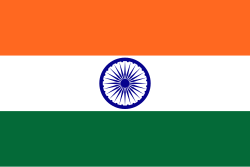Non-resident Indian

|
|
| Total population | |
|---|---|
| c. 30.8 million (December 2016) | |
| Regions with significant populations | |
|
|
4,460,000 |
|
|
3,004,585 |
|
|
3,986,274 |
|
|
2,803,751 |
|
|
2,008,337 |
|
|
2,000,000 |
|
|
1,825,000 |
|
|
1,560,000 |
|
|
1,614,000 |
|
|
1,016,185 |
|
|
923,260 |
|
|
994,500 |
|
|
990,001 |
|
|
950,000 |
|
|
900,000 |
|
|
690,000 |
|
|
619,164 |
|
|
556,800 |
|
|
465,000 |
|
|
400,000 |
|
|
327,000 |
|
|
315,000 |
|
|
220,000 |
|
|
186,100 |
|
|
160,000 |
|
|
156,000 |
|
|
148,000 |
|
|
120,000 |
|
|
110,204 |
|
|
110,000 |
|
|
93,000 |
|
|
91,520 |
|
|
80,000 |
|
|
70,000 |
|
|
70,000 |
|
|
65,000 |
|
|
60,000 |
|
|
50,000 |
|
|
43,600 |
|
|
35,000 |
| Languages | |
| Languages of India and various languages of the countries they inhabit | |
| Religion | |
|
Predominantly: Hinduism Minorities: |
|
| Related ethnic groups | |
| Indian people | |
A Non-Resident Indian (NRI) is a citizen of India who holds an Indian passport and has temporarily emigrated to another country for six months or more for employment, residence, education or any other purpose. A Person of Indian Origin (PIO) is a person of Indian origin or ancestry who is not a citizen of India, but is a citizen of another country. A PIO might have been a citizen of India and subsequently taken the citizenship of another country, or have ancestors born in India or other states.
According to a survey conducted by the United Nations Department of Economic and Social Affairs, India has the largest diaspora population in the world.
Strictly speaking, the term says non-resident refers only to the tax status of a person who, as per section 6 of the Income-tax Act of 1961, has not resided in India for a specified period for the purposes of the Income Tax Act. The rates of income tax are different for persons who are "resident in India" and for NRIs. For the purposes of the Income Tax Act, "residence in India" requires stay in India of at least 182 days in a financial year or 365 days spread out over four consecutive years. According to the act, any Indian citizen who does not meet the criteria as a "resident of India" is a non-resident of India and is treated as NRI for paying income tax.
A Person of Indian Origin (PIO) means a foreign citizen (except a national of Pakistan, Afghanistan Bangladesh, China, Iran, Bhutan, Sri Lanka and Nepal)
After multiple efforts by leadership across the Indian political spectrum, a pseudo citizenship scheme was established, the "Overseas Citizenship of India". The card is available to certain PIOs, and while it affords holders residency and other rights, it does have restrictions, and is not considered to be any type of Indian citizenship from a constitutional perspective.
Coinciding with Prime Minister Narendra Modi’s Australia visit in November 2014, the Indian community in Australia had launched an online campaign, appealing to him to grant dual citizenship to overseas Indians.The petition has also sought granting Indian passports to overseas citizens of Indian heritage with full political and economic rights, granting of convenient voting rights to such dual passport-holding overseas Indians as well as overseas Indians with Indian passports (NRIs), which can be exercised either at the consulate, high commission or embassy premises in their country of residence and through postal or online facilities.
...
Wikipedia
